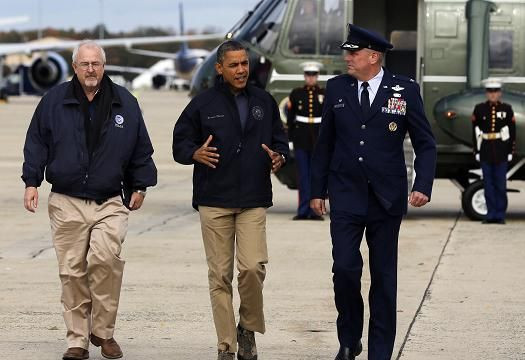It Isn't Over 'Til it's Over: Not Even Hurricane Sandy Can End US Presidential Campaign

Election Day may be less than a week away, but presidential politics is likely the last thing on the minds of the hordes of Americans struggling to recover from the ruinous storm that was Hurricane Sandy.
President Barack Obama continued his detour from the campaign trail this week, spending Tuesday and Wednesday focusing on storm response efforts up the East Coast. Republican nominee Mitt Romney’s campaign did the same Tuesday, setting aside a planned rally to hold a relief event for storm victims, before resuming the schedule in battleground states on Wednesday. Both candidates are attempting to strike a delicate balance: focusing on the government disaster response, while also attempting to regain any kind of political momentum that could help win the White House next week.
For Obama, taking on the role of commander-of-disaster-management may have already resulted in political rewards. To the professed amazement of many pundits, on Tuesday New Jersey Gov. Chris Christie described the president's storm response efforts as “outstanding", surprising praise from a Republican who earlier this year declared Obama was the “most ill-prepared person to assume the presidency in my lifetime.”
But the televised images of the two men side-by-side – Obama, essentially anathema to the Republican Party, getting along with one of the party’s most popular national figures – could help solidify Obama’s standing as a bipartisan leader capable of crossing the aisle during times of crisis.
And while Christie may have endorsed Romney early in the GOP primary process, he isn’t using the superstorm to highlight the Republican candidate's campaign. In an interview with Fox News’ “Fox and Friends,” Christie dismissed the idea of the Republican presidential nominee traveling to New Jersey in the wake of a storm – the exact trip Obama is making Wednesday – saying he had “no idea, nor am I the least bit concerned or interested” in whether Romney could take a trip to survey the damage.
Plus, Republicans may realize this isn’t the time to strike. Julian Zelizer, a professor of history and public affairs at Princeton University, told The Hill on Wednesday that he would be surprised to hear of reinforced attacks “unless Obama falls short in some obvious way,” or the Romney campaign could risk appearing petty or insensitive.
But that doesn’t change the fact that Romney already has at least one extra day on the campaign trail. The GOP challenger is stumping in Florida with Republican heavyweights Sen. Marco Rubio and former Gov. Jeb Bush, in a last push to appeal to early and potentially undecided voters in the electorally-rich swing state.
The real question is whether the damage caused by Sandy will keep people from the polls. A Gallup study of early voting patterns released this week found that 15 percent of registered voters nationwide have already cast their ballots via early voting; according to the survey a slightly higher percentage of Republicans (19 percent to 15 percent) than Democrats have already voted. Although there are reports the storm has disrupted early voting on the East Coast – a region that tends to largely vote Democratic – Gallup notes individuals in that region have a relatively low rate of early voting compared to other sections of the country.
In the Northeast, where several states have been affected by widespread power outages and flooding, officials are scrambling to make sure residents can vote. The Wall Street Journal reports Connecticut has given residents two extra days to register, while Maryland may be forced to resort to paper ballots in some locations without electricity.
According to the Obama campaign’s early voting blog, the president has a strong lead in battleground states such as Colorado, Florida, North Carolina and Ohio. But in a election where poll numbers seem to fluctuate on a daily basis according to the campaign's story of the day, it’s impossible to confidently predict which candidate will win next week.
The Obama campaign knows it. The president is scheduled to get back on the campaign trail on Thursday, when he will make last-minute appearances in Nevada, Colorado and Ohio, before heading into a weekend of campaign events that likely won’t conclude until Election Day.
© Copyright IBTimes 2025. All rights reserved.





















